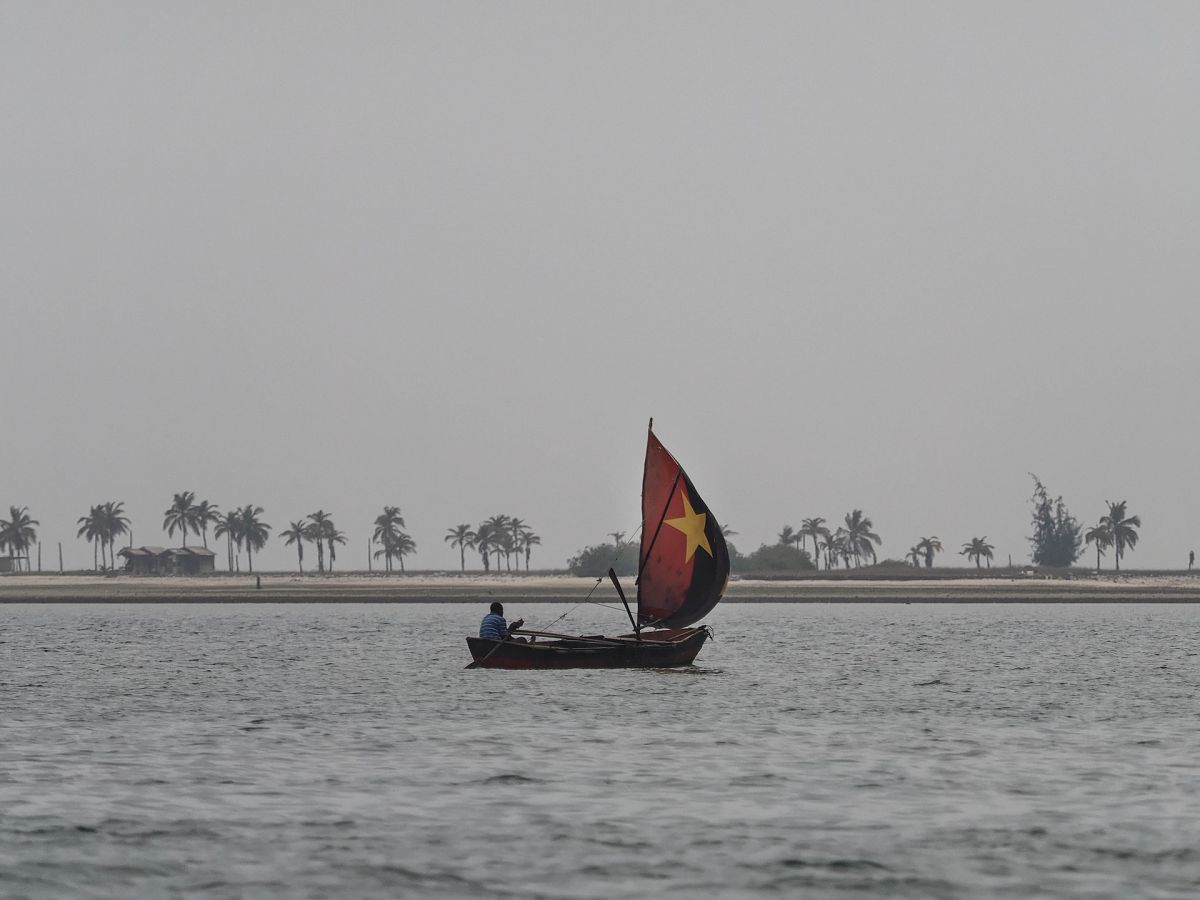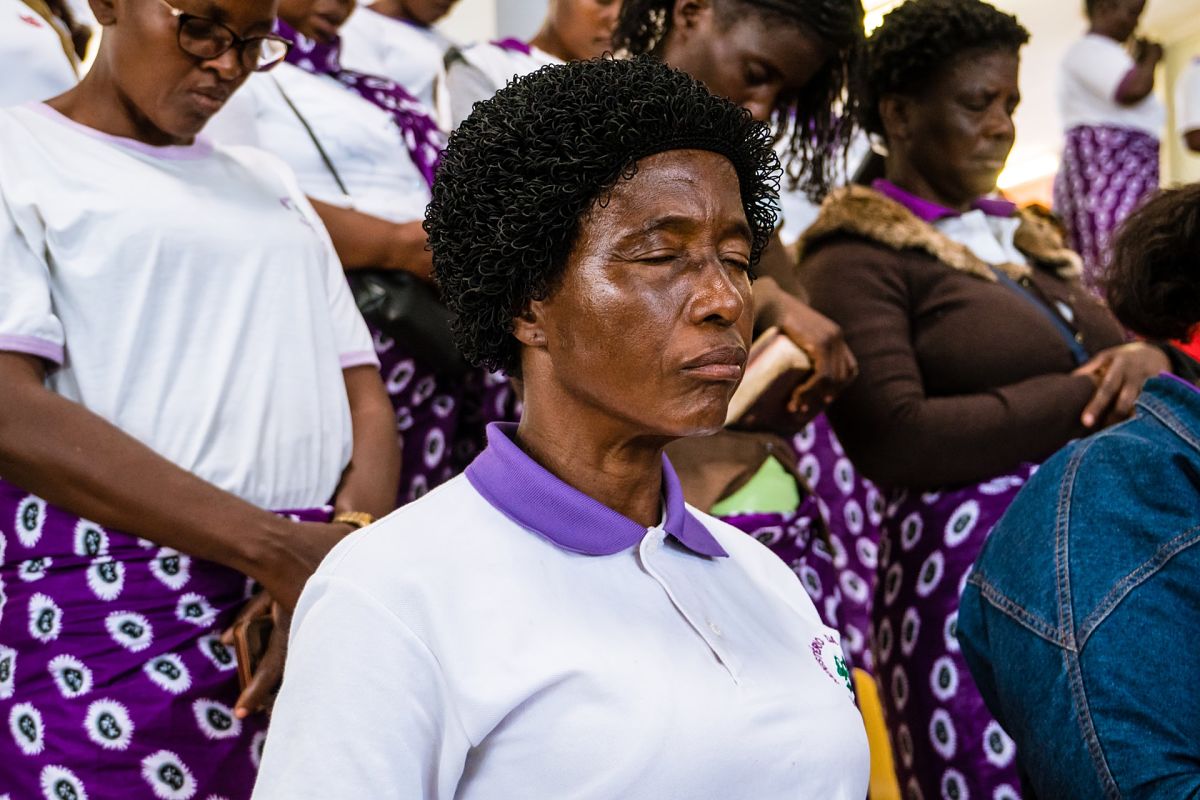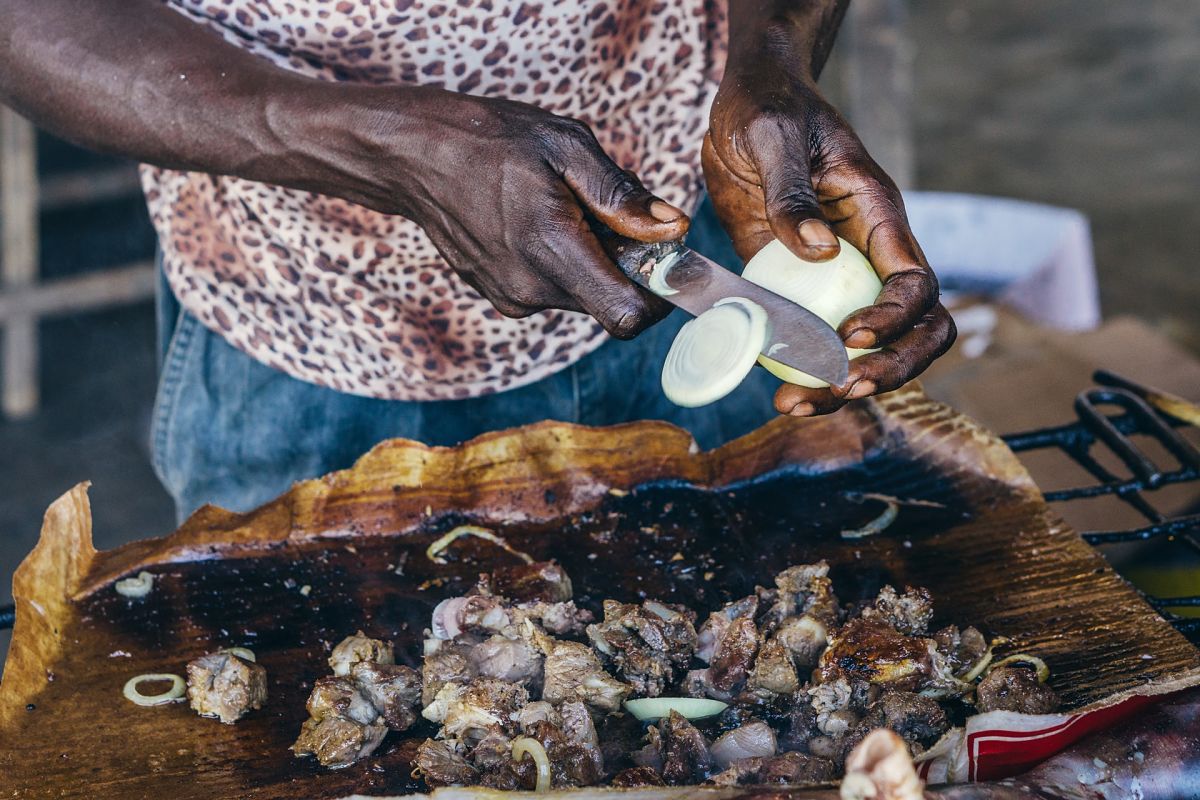Angola - Culture, Etiquette and Business Practices
What will you Learn?
You will gain an understanding of a number of key areas including:
- Language
- Religion and beliefs
- Culture and society
- Social etiquette and customs
- Business culture and etiquette

The Angolan flag is based on the flag of the Popular Movement for the Liberation of Angola (MPLA), which fought Portuguese colonial rule and emerged as the ruling party of Angola following the Angolan Civil War. Photo taken in Luanda by Jorge Sá Pinheiro on Unsplash
Stereotyping
Remember this is only a very basic level introduction to Angolan culture and the people; it cannot account for the diversity within Angolan society and is not meant in any way to stereotype all Angolan people you may meet!
Facts and Statistics
- Location: Southern Africa, bordering the South Atlantic Ocean, between Namibia and Democratic Republic of the Congo
- Capital: Luanda
- Population: 32.87 million (2020 est.)
- Ethnic Groups: Ovimbundu 37%, Kimbundu 25%, Bakongo 13%, mestico (mixed European and native African) 2%, European 1%, other 22%
- Religions: Roman Catholic 41%, Protestant 38%, Indigenous and Other beliefs 9%, None 12%
Language in Angola
Portuguese is both the official and dominant language, in the black, mestiço and white populations of Angola. It is spoken as the primary or secondary language by almost 80% of the population.
- Approximately 25% of Angolans, speak Portuguese as their first language, whilst 40% of Angolans speak one of the six national Bantu languages.
- The most common Bantu languages include Kimbundu, Umbundu, Kikongo, Chokwe, Kwanyama and Ngangela, (all of these have many Portuguese-derived words).
- Younger generations are increasingly moving towards the exclusive use of Portuguese in their day to day life.
- The use of Portuguese in Angola is rooted in Portuguese rule, which imposed both religion and language on local Angolans.
- Angolans speak a form of Portuguese which resembles Brazilian Portuguese – although the pronunciation is more European.

Women at prayer by Francisco Venâncio on Unsplash
Angolan Society and Culture
Portugal began their 400-year period of colonisation and rule of Angola in 1575. The Angolans did not win their independence until 1975. For this reason, the indigenous Bantu culture of Angola has been greatly shaped and influenced by Portuguese culture. Like the Portuguese, most Angolans speak Portuguese and practice Roman Catholicism. It's important to recognise however, that these dominant cultural traits are expressed against a backdrop of considerable cultural diversity in Angola due to the many ethnic communities and tribes indigenous to the country.
The Angolan People
Although many people when asked may say they are Angolan, most of them will really have their primary sense of identity and loyalty to a tribe.
- The various tribes and ethnic groups tend to cluster in certain areas of the country each with their own customs, language and history.
- The major ethnic groups are the Ovimnumdu, the largest, who live predominantly in the central highlands; the Mbundu who cluster around Luanda province; and the Bakongo who live in the northwest provinces.
- Other large groups include the Nganguela and the Lunda-Chockwe.
Religion
As you might expect in a country that was a Portuguese colony for over 500 years, the majority of the people are either Christian (Roman Catholic) or follow native beliefs.
- Most incorporate beliefs such as ancestor worship within a more formal religion.
- The constitution guarantees freedom of religion. Religious leaders played an important role in the democratic resolution of the civil war and are ardent campaigners for social justice and human rights.
Spirit Worship
Traditional Angolan religions believe in a close connection with the spirit of dead ancestors. They believe that ancestors play a part in the lives of the living. Therefore, the spirits of dead ancestors remain prominent members of the community.
- Ancestral worship is a common thread through many indigenous religions.
- It is considered that not revering the dead can jeopardize the living.
- It is thought that people must appease the ancestors so that they do not harm the living.
- It is believed that ancestors can bring famine, plague, disease, personal loss, and other catastrophes.
- Ancestors are worshiped through ritual performances and ceremonies that often involve the sacrifice of animals.

Fresh food being prepared. Photo taken in Kwanza by Catia Dombaxe on Unsplash
Etiquette and Manners in Angola
Meeting People
- The most common greeting is the handshake.
- Close friends may embrace, kiss, or offer a friendly back-slap.
- As in most African countries, greetings should never be rushed.
- It is important to take time to inquire about the person’s family and other matters of general interest during the greeting process.
- Always greet elders first. It is also customary to bow when introduced to someone who is obviously older or has a more senior position.
- In rural areas, women do not look the other person in the eye, although this practice is less pronounced with younger Angolans and in Luanda.
Gift Giving Etiquette
- Gift giving is only really practised in urban areas.
- It is not so much a part of Angolan culture and as a result there are not many tips surrounding it.
- If you are invited to an Angolan's home, bring fruit, flowers, or chocolates to the host.
- A small gift for the children is always appreciated.
- Gifts are not always opened when received.
Dining Etiquette
- Angolans are extremely hospitable and enjoy entertaining friends and family in their homes.
- In Luanda, they may also entertain in restaurants or cafés since they have adopted more Western ideas about socializing.
- The Angolan approach to entertaining retains much of the Portuguese influence, including the time of dinner invitations which are often 8 p.m.
- Dress as you would in the office. Dressing well demonstrates respect towards your hosts. Shake hands with each guest individually.
- Try not to discuss business in social situations.
- Food is often served from a communal bowl.
- Use the serving spoons to scoop food from the communal bowl on to your individual bowl.
- Hierarchy dictates that the eldest person is the first to take food from the communal plate.
- If offered the last serving of an item, offer an initial refusal and expect your host to then offer the item a second or third time, in which case you may accept.
Getting the right shot. Photo taken in Huambo by Olhar Angolano on Unsplash
Business Culture and Etiquette in Angola
If you're looking for expert help and advice on how to doing business in Angola, then this is what we do!
Click here to learn more about our customized cultural training.
Meeting and Greeting
- Greetings are formal and courteous and include a handshake.
- Women should avoid making direct eye contact during the greeting process.
- Although this is less important in Luanda, since many people in the city are from another place in the country, it is a good idea to emulate the behaviour of the person you are greeting.
- Greetings often follow the African protocol of polite questions about one’s health and other social pleasantries.
- It is important not to rush this process. When meeting someone more senior than you in age or position, it is considered polite to bow slightly.
- If you know a person’s professional title, you may use the title when conversing.
- Government officials may be addressed as “Excellency” or "Excelencia" without using their surname.
- Business cards are given without formal ritual.
- Although not all Angolans have business cards, they expect expats and business travellers to have them.
- Present your card so it is readable to the recipient.
Communication Styles
Angolan business people are somewhat formal and business communication tends to be restrained.
- Angolans strive to please others and as a result have a tendency to say what they think the other person wants to hear.
- It is often difficult to get definite answers to questions, especially if the response would be negative.
- You may get a ‘yes’ when the answer is actually ‘no’. It is important to watch for evasions or half statements.
- Rather than accept assurances at face value it may be prudent to ask for specifics so that both sides have the same understanding of what statements mean.
- Since Angolans prefer to do business with those they know and trust, they spend a great deal of time on relationship building.
- It is important to devote sufficient time to nurturing a relationship before pressing on to the business at hand.
- Communication is formal and follows established rules of protocols. Angolans do not interrupt others who are speaking and expect to be afforded the same courtesy in return. Interrupting someone, especially if they are more senior to you in age or position, is a serious breach of etiquette.
- Angolans use head and arm gestures to emphasize both positive and negative messages and can become very animated at times.
- Angolans do not require a great deal of personal space when conversing. If you back away, you may give offense or the person may step forward to close the gap.
- When speaking with someone at your own level, direct eye contact means that you are sincere.
- When speaking to someone who is senior to you in age or position, indirect eye contact demonstrates respect.
- In general, women do not make direct eye contact when conversing with men, although this is changing.
Business Meetings
The first meeting is often used to get better acquainted and business may not be discussed.
- Angolans prefer to do business with people they know and trust, therefore, the first meeting is often used to determine if you are the type of person with whom they would want to conduct business.
- This getting-to-know-you conversation is an important part of business and should not be rushed.
- Meetings are not always as private as they are in many other cultures.
- In fact, it may appear that there are several meetings taking place in the same room.
- Agendas are not part of the business culture. If provided, they generally act as a starting point for discussions rather than an itemized list of what will be covered.
- Attempting to rigidly adhere to an agenda is not recommended, unless you are meeting with the petroleum industry.
- Meetings have a formal ambiance. It is suggested that you not remove your suit jacket unless invited to do so, as this is seen as too casual.
- A strong Portuguese influence remains prevalent in Luanda and adhering to such behaviour demonstrates respect to the people with whom you are meeting.
THANKS FOR READING OUR GUIDE TO ANGOLA - SHARE IT IF YOU LIKED IT!
Do you need to cite this page for school or university research?
Please see below examples.
Simply change the country name depending on which guide you are referencing.
MLA Format:
Commisceo Global Consulting Ltd. Afghanistan - Language, Culture, Customs and Etiquette. www.commisceo-global.com. 1 Jan. 2020 https://commisceo-global.com/resources/country-guides/afghanistan-guide
APA Format:
Commisceo Global Consulting Ltd. (2020, January 1) Afghanistan - Language, Culture, Customs and Etiquette. Retrieved from https://commisceo-global.com/resources/country-guides/afghanistan-guide
Harvard Format:
Commisceo Global Consulting Ltd. (2020). Afghanistan - Language, Culture, Customs and Etiquette. [online] Available at: https://commisceo-global.com/resources/country-guides/afghanistan-guide [Accessed ENTER DATE].

 +44 0330 027 0207 or +1 (818) 532-6908
+44 0330 027 0207 or +1 (818) 532-6908


